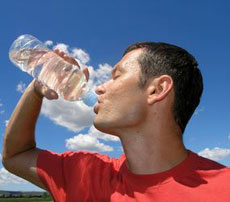Top off your fluid level
to beat the heat

Stay hydrated to beat the heat and humidity.
It's summer in Chicago and that means heat and humidity are high, which can pose challenges for exercising.
If you are unaccustomed to exercise in these conditions, give yourself a chance to acclimatize by building up your workout routine. It generally takes about two weeks for the body to fully adapt to warm weather.
The body typically cools itself by increasing surface blood flow, or relying mainly on evaporation on a windless day. Add humidity, and our body's air-conditioning system is severely taxed. Staying hydrated can help. Electrolyte replacement is critical for ultra-endurance events, but for most exercise, the body can catch up on losses from perspiration through a normal diet.
With heavy exertion, an individual may lose up to three pounds of fluid per hour. During exercise, fluid replacement is required at the rate of five to seven ounces of fluid every 10 to 15 minutes. Plain water will work for most activities. For those whose exercise interrupts meals, sports drinks supplement calories while hydrating. Sports drinks containing 4 to 8 percent glucose sugar are easily absorbed. Be careful about drinks with higher glucose, since those concentrations tend to slow stomach emptying time, which can possibly lead to cramping. Excessive fructose sugar levels can produce diarrhea.
What you do prior to exertion in the heat also has a big impact on your heat tolerance. Alcohol can increase urine output, causing dehydration. It also can encourage blood flow to the skin's surface, alter the body's temperature set point and potentially augment heat stress further by diminishing the body's salt content, which affects water retention. Try to avoid alcohol for 24 hours prior to competition or exercise. If you do decide to imbibe alcohol post-exercise, rehydrate first and take the alcohol with a meal.
We're stuck with what weather we're dealt. How we weather the weather is largely left up to us.
-- Brian Svazas, M.D.
Safety Tip of the Week Archive
|